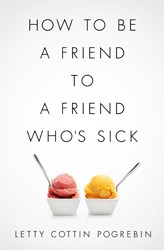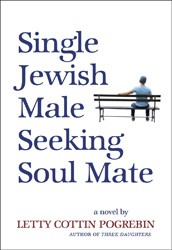With Shanda, feminist activist and writer Letty Cottin Pogrebin delivers a powerful new memoir that mines her life experiences as they pertain to cross-generational shame and secrecy. Pogrebin, one of the founders of Ms. Magazine and a consulting editor for the groundbreaking television version of Marlo Thomas’s Free to Be … You and Me, is beloved by a generation of Jewish feminist readers for her 1991 memoir, Deborah, Golda, and Me: Being Female and Jewish in America, and her 2003 novel, Three Daughters.
Inspired by her granddaughter’s biography project for a college course, Pogrebin returns to a trove of family letters and documents that she inherited when her older sister died. She puts these materials to good use, demonstrating both how valuable family memorabilia is to understanding the past and also how fraught, conflicting, and incomplete memory and passed-down stories are. Combining the documents with conversations with family members, Pogrebin explores her early life and the secrets of her family and then expands to reflect more broadly on public secrecy and shame.
Pogrebin’s commitment to examining her own life is inspiring. She proceeds with a steely determination to discover truths and hold herself accountable while maintaining compassion for her younger self. She recalls a time when she and her family did not do enough to support a cousin with cognitive disabilities, having lacked the skills and resources to treat them with care. Pogrebin also draws on examples of family support alleviating the suffering of those with hidden shames: abortions, relatives struggling to come out as gay or trans, issues with drugs and alcohol. In these stories, shared intergenerational knowledge helps people navigate their shandas in ways that are incredibly moving. In moments when Pogrebin seeks not to expiate herself but to lay bare the dynamics of shame and secrecy and their real consequences on people’s lives, Shanda necessarily shimmers.
As a storyteller, Pogrebin is breezy and confident, making the book as pleasurable as it is informative. She seems to suggest that, while many of these largely Jewish stories describe events of yore, public and private shandas continue to take hold.
Julie R. Enszer is the author of four poetry collections, including Avowed, and the editor of OutWrite: The Speeches that Shaped LGBTQ Literary Culture, Fire-Rimmed Eden: Selected Poems by Lynn Lonidier, The Complete Works of Pat Parker, and Sister Love: The Letters of Audre Lorde and Pat Parker 1974 – 1989. Enszer edits and publishes Sinister Wisdom, a multicultural lesbian literary and art journal. You can read more of her work at www.JulieREnszer.com.
Discussion Questions
Courtesy of Letty Cottin Pogrebin
- Among the animating themes in Shanda are fear of shame, the “ruinous impact” of public disgrace, and the burdens of secrecy. Do those issues still resonate in this era of hyper- sharing? What role do shame and secrecy play in your life?
- While writing this book, Pogrebin happened upon a trove of deeply personal letters exchanged between her parents more than eighty years ago. That discovery greatly expanded her purview of the past and sometimes challenged her own memories. Were you to write a memoir, what written materials would be available to you? Since long- form letter writing has largely been replaced by slap-dash texts and inartful emails, do you think future biographers and historians will be hobbled by a paucity of original documents and will readers suffer the consequences?
- The author writes, “Guilt is the by-product of our actions toward others; shame is the by- product of our judgment of ourselves. Guilt says, ‘I did a bad thing;’ shame says, I am a bad person.’” How would you define the difference between guilt and shame? Which of those emotions is more familiar to you personally?
- Pogrebin delves into many secrets that her immigrant Jewish family considered shameful– failed marriages, poverty, mental deficiency, certain physical conditions, infractions of Judaism, to name a few. What do you consider shameful today?
- Revisiting her sexual assault in the 1960s by a famous playwright, Pogrebin admits, “Now, in 2022, I’m ashamed of having sugar-coated my ordeal in Brendan Behan’s hotel room, reducing it to a breezy anecdote, and I’m embarrassed by how blithely I transformed an aggravated assault by a powerful man into a ‘sticky sexual encounter.’” In this age of #MeToo, how do you regard her experience in that hotel room and her reaction to it? If you’ve survived something similar, what did you do about it?
- Shanda describes Holocaust survivors who hid their wartime traumas from their children and grandchildren; she also describe Jews in America who secretly felt ashamed that millions of their fellow Jews went to the ovens “like sheep.” What was your response to those stories?
- Pogrebin shows how fear of shame can overpower self-interest and self-respect. How did you react to the request by the “comfort” women’s grandchildren that the old women stop seeking justice from their Japanese tormentors? How about the decision by “Ruby” not to expose her father’s violent incest? What needs to happen for survivors to feel safe admitting such secrets? Is public exposure of the perpetrator necessary before survivors can attain justice and achieve closure?
- The scene at the pool party when Faye arrives is a familiar one. Do you consider yourself to be “sizeist?” Have you ever experienced body shame? Have you ever been a secret eater? Binger? Purger?
- In her chapter, “Motherguilt,” Pogrebin, a staunch feminist, social justice activist and mother of three, confesses, “Whether the focus of my work outside the home was on women, Jews, or Israel, it sometimes led me to shortchange my role as a mother.” If you’re a parent, do you feel you’ve achieved a satisfactory work/family balance? If not, how weighed down are you by motherguilt? (Or fatherguilt?)
- The author writes about public shame, the shame of nations, and candidly describes her progressive politics and her condemnation of Israel’s treatment of the Palestinians. If you disagree with her views on that Middle East conflict or any other political or religious issue discussed in the book, does it color your feelings about her or her story?
- For more than thirty years, Pogrebin sought her mother-in-law’s love and approval and felt ashamed of her failure to get it. Have you ever blamed yourself for a comparable rejection? Did the mother-in-law’s deathbed apology redeem her in your eyes?
- Every immigrant and every ethnic group has its own version of Pogrebin’s story. Did someone Americanize your family name? Was anyone in your family ashamed of their ethnic, economic, or religious origins to the point where they denied or altered their identity? Do you fault that person for falsifying who they are, or do you credit them with adaptation, assimilation, and reinvention?
- If you’re an Ashkenazi Jew, did you relate personally to the author’s description of her family’s inclinations regarding shame and secrecy? If you’re not an Ashkenazi Jew, discuss how your heritage and experiences have differed.
- Letty Cottin Pogrebin wants to be free of all secrecy but not of all shame. Do you share that goal? How close are you to achieving it?
- If you were casting the movie, who would play Letty? Bert? Their kids? Betty? Rena? Jack? Ceil? Aunt Tillie? Nathan? Jenny? Uncle Al? Jeffrey? Simma? The boy with the broken hand? Dr. Spencer?





